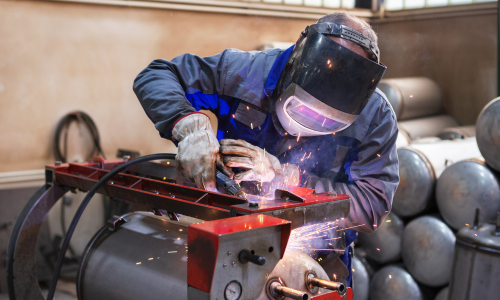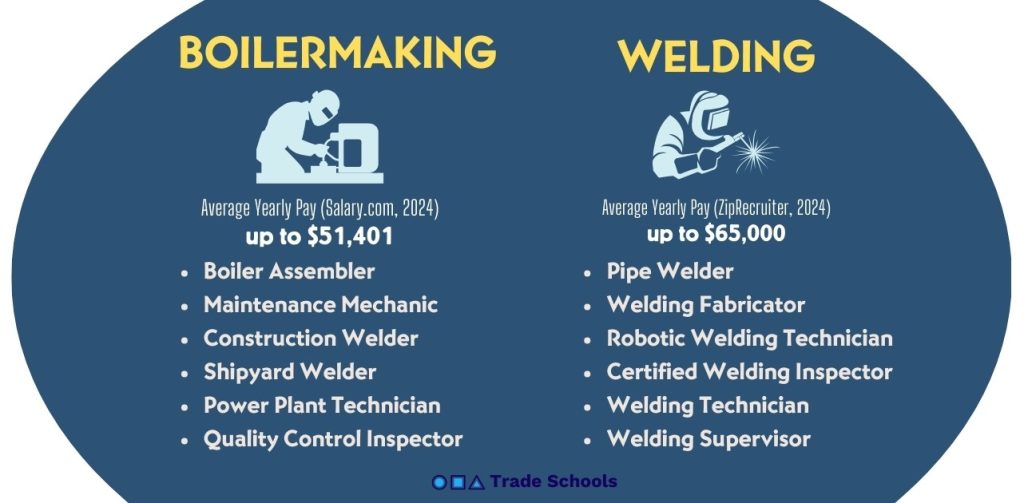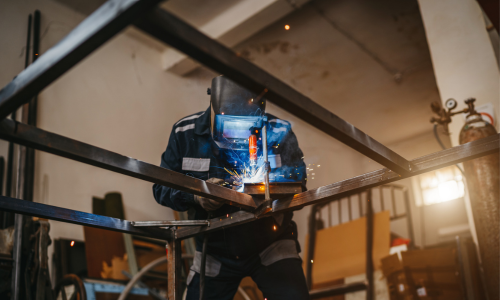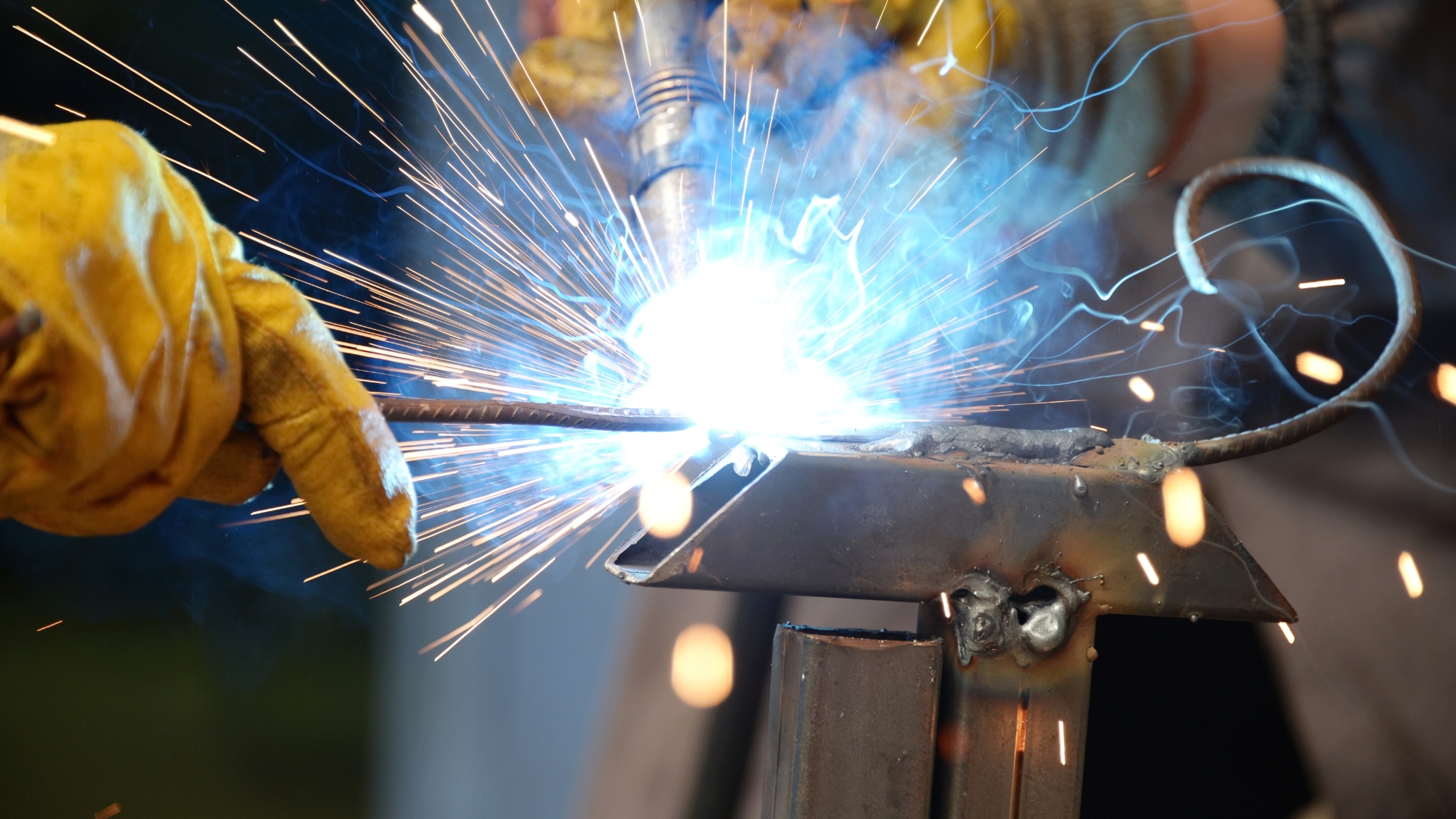Metal fabrication–the process of shaping raw materials into usable components and products for infrastructure and technological purposes—is crucial to the construction, manufacturing, automotive, and aerospace sectors.
As two key disciplines within the metal fabrication field, boilermaking and welding involve a unique set of skills and applications and present in-demand trade career opportunities.
What is Boilermaking?
Boilermaking is oriented toward the construction, installation, and maintenance of boilers, pressure vessels, and related equipment used in industrial settings. Often working with steel, boilermakers design and build large metal structures, such as tanks, vats, and storage containers, using welding machines, cutting torches, and hydraulic presses.
Specifically, boilermaking is used in boiler construction, tank fabrication, structural steel fabrication, and pressure vessel manufacturing. Boilermakers play a critical role in ensuring the safe operation of industrial facilities in sectors like energy generation, petrochemicals, and manufacturing.
The Path to Becoming a Boilermaker
Becoming a boilermaker involves a mix of education and training, usually lasting from one to four years of formal education and apprenticeships spanning three to five years. You may start with an associate degree program or take affordable Welding Technology courses.
These programs provide basic knowledge in welding techniques, blueprint reading, and metalworking essentials that will prepare you for specialized technical training. Emphasizing skills development and problem-solving abilities, most coursework offered by leading technical schools covers welding processes, metallurgy, safety protocols, and mechanical system operation.
Boilermaker training often involves on-the-job experience through apprenticeship programs or supervised work placements. Here, you’ll be trained in important areas like welding various metals, precision measuring, fabrication, and troubleshooting mechanical systems. Apprentices work alongside experienced professionals while earning a salary.
While not always required, some states or employers may require boilermakers to get certifications or licenses. You may complete welding certifications from organizations like the American Welding Society (AWS) or the National Center for Construction Education and Research (NCCER).

Career Options for Boilermakers
Boilermakers possess a diverse skill set that allows them to pursue different career opportunities across multiple industries.
Boilermakers are tasked to fabricate, perform inspection and maintenance, and conduct repairs in these industries:
- Construction
- Manufacturing
- Shipbuilding
- Power generation
- Railroad
- Nuclear power
You may want to pursue highly specialized areas like Pressure Vessel Fabrication or Welding Inspection to land higher-paying positions and leadership roles.
Boilermaking is a good fit if:
- You’re drawn to mechanical systems and enjoy working with heavy machinery equipment in a physically demanding field.
- You’re detail-oriented and possess excellent problem-solving abilities to troubleshoot complex issues.
- You’re able to visualize and interpret complex plans and have spatial reasoning skills.
- You enjoy taking precise measurements and accurately assembling components.
Boilermaking is NOT a good fit if:
- You prefer working in controlled environments that are stress-free and avoid changing weather conditions.
- You find the challenging conditions of industrial sites and construction sites scary.
- You have limited physical strength and struggle with manual labor or heavy lifting.
- You’re afraid of heights since boilermakers often work at elevated heights.
Boilermaking vs Welding
Understanding the key differences between boilermaking and welding will help you start a career in the metal fabrication industry. The table below shows key aspects that will help you in weighing in on your career choice:

What is Welding?
Welding is a fundamental process in metal fabrication involving the joining of metal parts or components through fusion. Welders use heat, pressure, or a combination of both to melt and fuse metals, creating strong and durable bonds. This process is important for constructing buildings, bridges, pipelines, and various machinery.
Depending on project requirements, welders work with a wide range of metals, including steel, aluminum, and titanium, and use different welding techniques. The common types of welding works are:
- MIG Welding (Metal Inert Gas): MIG welding uses a wire electrode and shielding gas for versatile joining.
- Stick Welding (Shielded Metal Arc Welding): Stick welding is portable and suitable for outdoor maintenance and repair work.
- Submerged Arc Welding (SAW): SAW is commonly used in heavy fabrication industries like shipbuilding and pressure vessel manufacturing.
- Gas Welding: Gas welding employs a flame for melting metals and is used in specialized applications like metal sculpture and jewelry making.
The Pathway to Becoming a Welder
A trade career benefit that welders enjoy is the low-cost, fast, and work-ready training that they acquire. A Welding Technology program usually covers the basics of welding techniques, safety protocols, metallurgy, and inspection at a fraction of the cost and time required by a college degree.
Paired with theoretical learning, technical training programs also focus on developing hands-on skills in using various machine tools and welding processes. During training, you’ll get the practice needed to build on important skills such as precision, attention to detail, and problem-solving.
Gaining practical experience through internships, apprenticeships, or entry-level positions is important for refining your skills and expanding your professional networks. Staying updated on industry trends and technological advancements may also help you become more competitive in the field.
While licensure requirements may vary by state, obtaining certification from organizations like the American Welding Society (AWS) can help you land jobs easily. Certification usually involves passing both written and practical exams.
Career Options for Welders
There’s a wide range of career options available for welders, spanning from manufacturing to automotive, aerospace, and gas companies. The most common pathway is to work in construction, fabricating, and joining metal components to build bridges and other infrastructure projects. If you love adventure while working, you might want to consider working as an underwater welder. They perform welding tasks underwater, which include repairs to offshore oil rigs, pipelines, and other structures underwater.
As welders gain experience, they can also advance in their careers by specializing in areas like Robotic Welding or Pipe Welding. Experienced welders can also transition into teaching roles as welding instructors or trainers, sharing their knowledge and skills with future welders.
Welding is a good fit if:
- You enjoy hands-on work and creating tangible products, even with an artistic touch.
- You pay meticulous attention to detail to ensure the quality and integrity of your welds.
- You’re open to challenges, thriving in dynamic environments and unpredictable work settings.
- You have a keen eye for detail and precision in producing high-quality welds.
Welding is NOT a good fit if:
- You’re not comfortable working with heat exposure, burning fumes, metal sparks, and potentially hazardous materials.
- You lack attention to detail, precision, and accuracy skills.
- You have mobility issues and often struggle bending, kneeling, and reaching into confined spaces.
- You’re not very adaptable to working on welding projects in a fast-paced and changing environment.

Final Word
Both boilermaking and welding are integral areas of the metal fabrication industry, offering rewarding career paths for individuals with diverse skill sets. While boilermakers focus on constructing and maintaining industrial equipment, welders specialize in joining metal components to create structures and products.
By understanding the differences between these two disciplines and considering your strengths and preferences, you can make better career decisions and pursue trade careers that pay well and align with your goals.

